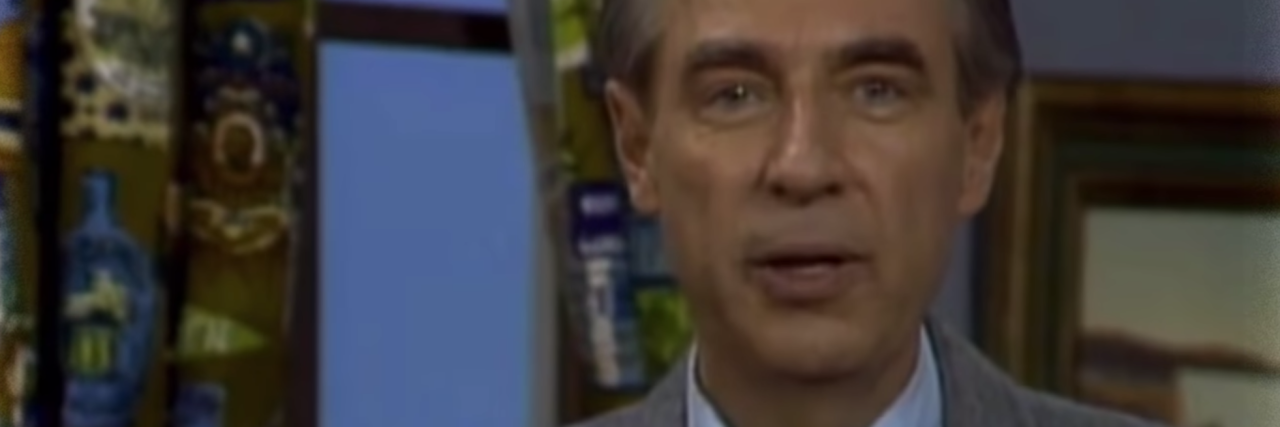How Childhood Trauma Ruined Mr. Rogers Until Now
Editor's Note
If you have experienced emotional abuse, the following post could be potentially triggering. You can contact the Crisis Text Line by texting “START” to 741741.
If you’ve experienced sexual abuse or assault, the following post could be potentially triggering. You can contact The National Sexual Assault Telephone Hotline at 1-800-656-4673.
I’ve been thinking about the Mr. Rogers movie, “It’s a Beautiful Day in the Neighborhood,” which I saw last night. It’s so impactful. He was such a remarkable man with such a unique view of life. The sad thing is, I wasn’t one of those kids who grew up loving him.
I watched his show, but I was already watching from the jaded perspective of an “old soul” or a “little adult.” I already knew from a very young age that feelings were dangerous and I had too much at stake to just be a child, full of wonderment and innocence. Feelings meant potentially triggering my mother into a fit of dysfunction and so I kept all my feelings under lock and key. His way of trying to make feelings normal went completely over my head and kind of irritated me.
What’s more is that I was convinced he was a pedophile. Not that I had the word to define what a pedophile was, but I knew what they acted like from my own experience being sexually abused by my stepgrandfather. Here was a guy, being super nice to kids, paying a lot of attention to them, hugging them and playing with toys. In my mind that was what pedophiles did to get kids to do “bad things.”
I had this nagging feeling into adulthood. So when I heard about this movie coming out, I was originally skeptical. Then, I saw that Tom Hanks was playing the part and I love him, so I softened to the idea. Then the HBO documentary about Mr. Rogers, “Won’t You Be My Neighbor,” came out and many of my friends talked about how he saved their lives, how he was a source of comfort, a parental figure. This intrigued me.
I generally perceive myself to be a good judge of character, so how could I have so grossly misjudged this man? Could trauma be so insidious that it makes you blind to the very thing you may need to help you sort through it? It didn’t make sense to me.
So, I watched the HBO documentary and was intrigued at the very least. Still maybe a bit skeptical, but I began to see glimpses of what this man had that made him so relatable.
Enter the movie. I’ve been really emotional lately and frankly, it’s always been embarrassing to me — and dangerous, even — to cry. Feeling things like sadness, rage, pain, betrayal or grief was like a grenade. If you let them loose, they may destroy everything around you. And here is this man talking about being perfect just as you are, saying being sad is OK, challenging adults to remember what they were like as children (which is challenging because I never was a typical child) and reminding us that we were “loved into being,” which frankly I can’t wrap my head around because my definition of love as a child felt more like a dangerous game of teeter-totter. If I acted in a certain way or did the right things, I got attention. If I didn’t act in the right way or didn’t do the right things, suddenly I was drowning in overwhelming terror.
During the movie, I sat there for the entire minute that he took to think about “those who loved us into being” and I grew more and more uncomfortable. I know there were people who loved me as a child, but sometimes love felt too conditional to be truly nurturing and sometimes it felt stifling and smothering, like it might just snuff out my very existence.
After the movie I kept thinking about it. I couldn’t shake the guilt I felt for holding on to the anger I feel toward those who hurt me as a child. What I realized is that part of it is because I never really got a chance to feel those feelings and I’m just now being allowed, like a child, to discover them and allow myself to feel them for the first time. The other part of it is that forgiveness may be not allowing toxic relationships back into your life, especially if the other individual isn’t truly remorseful and isn’t capable of making changes in their behavior.
Maybe in my case, the person I have to forgive is my child self for not allowing herself to be a child, for doing the best she could with the hand she was dealt, even if it meant she didn’t get to experience things like the joy of watching Mr. Rogers. Maybe by forgiving myself I can begin to lift the veil that seems to have blinded me to the true love I did receive that did bring me into being. Teachers, television characters, celebrities … and as I’ve grown older, my husband, my cat, my “framily” and my therapists.
And finally, he says: “If it’s mentionable, it’s manageable.” I couldn’t have articulated any of this without having gone through therapy. I couldn’t have identified the source of my guilt, my feelings, my trauma or my attachment wounds. Because I now have the language for all of this; I can finally talk about it, loudly, articulately and consistently with trustworthy others. By doing so, I can create healthy new connections with those who really care, just like Mr. Rogers did, and create my own little safe neighborhood. Thank you, Mr. Rogers, for teaching me how to be a child for the first time.
Image via YouTube

